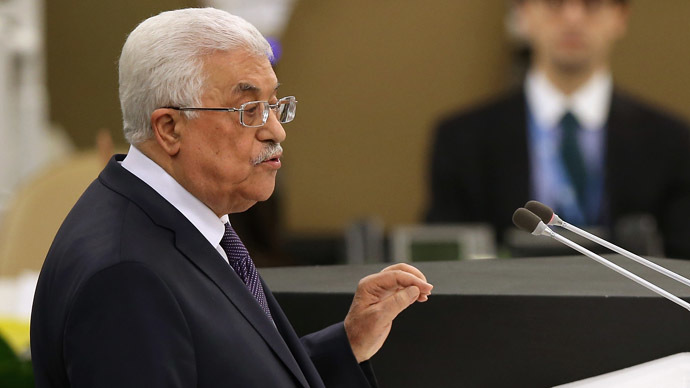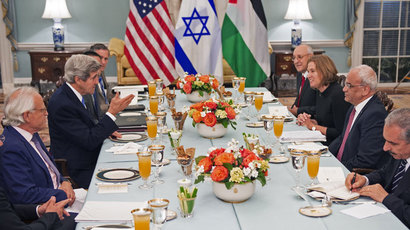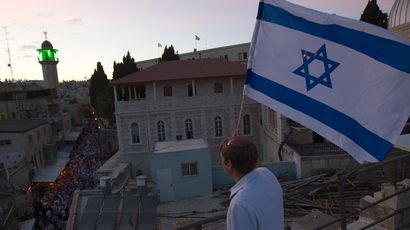‘Last chance’: Abbas urges UN to pressure Israel over settlements

Mahmoud Abbas has described the latest round of Israeli-Palestinian talks as the ‘last chance’ for peace and has called on the international community to seize that chance by following the EU in outlawing Jewish settlements on occupied territories.
Speaking in front of the UN General Assembly on Thursday, the
Palestinian president called on the organization’s member states
to put pressure on Israel, so that it would give up on its
settlement construction program, seen as a major obstacle for
current peace talks to end the decades-long conflict.
“Time is running out, the window of peace is narrowing and the
opportunities are diminishing. The current round of negotiations
appears to be a last chance to realize a just peace,” Abbas
said.
He cited the EU as an example of dealing with the issue of the
Israeli settlements on Palestinian lands. A new EU policy sees
assistance grants – including funds, stipends, scholarships and
investments – denied to Israeli entities with any direct or
indirect connection to the West Bank, East Jerusalem or the Golan
Heights.
“The position of the European Union with regard to settlement
products is a positive model of what is possible to be done in
order to ensure an environment supportive of the negotiations and
the peace process,” Abbas told the UN General Assembly.
While pledging full commitment to negotiations with Israel, which
resumed in July after a three-year stalemate, Abbas has also said
that his own 20-year efforts at striking a deal with Israel left
him with “dispiriting and bleak” picture of prospects for
reaching a resolution.
The president stressed Palestine wanted a “permanent and
comprehensive” agreement.
“Here, we reaffirm that we refuse to enter into a vortex of a
new interim agreement that becomes eternalized, or to enter into
transitional arrangements that will become a fixed rule rather
than an urgent exception.”

Abbas’s speech came a day after US Secretary of State John Kerry
came up with an optimistic vision for the relaunched
Israeli-Palestinian peace talks
“All of the issues are on the table -- territories, security,
refugees, Jerusalem. All of the final status issues are on the
table,” Kerry said.
The United States, which brokers the negotiations, has pledged to
have them intensified and set up a goal to have the talks
completed in nine months. Kerry revealed on Wednesday that
Israeli and Palestinian negotiators had already met seven times
since the peace talks were resumed.
Abbas addressed the UN for the first time since the General
Assembly upgraded the status of its Palestinian mission to that
of “non-member observer state” last November. The president’s
speech was given an ovation.
The Israeli delegation was not attending the assembly on
Thursday, as it was the day of a Jewish holiday of Sukkot.
While most of the analysts described Abbas’s speech as a moderate
one compared to his previous tougher rhetoric, Israel’s Strategic
Affairs Minister Yuval Steinitz condemned the address as
“anti-peace”.
“Instead of condemning terror, it condemns those who struggle
against terror. He said that we exaggerate our claims,”
Steinitz said as cited by The Times of Israel.
That’s in contrast to an opinion by parliamentary opposition
leader Shelly Yechimovich of the center-left Labour party, who
said that Abbas’s words “foster cautious hope that we face a
new era of dialogue that might lead to an accord,” according
to a statement from her office cited by Reuters.
Israeli Prime Minister Benjamin Netanyahu will address the UN on
Tuesday. He is scheduled to meet with President Obama a day
before that.














